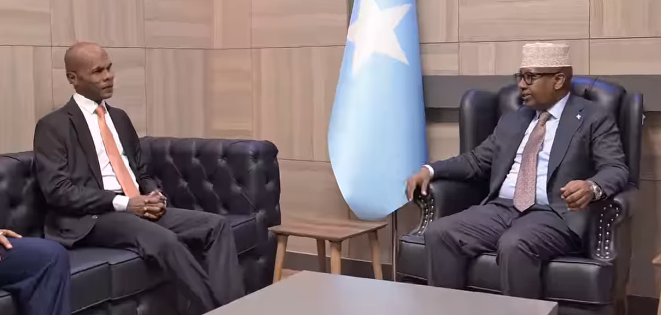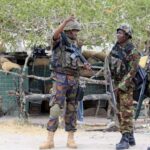MOGADISHU, Somalia — On Monday, at the Ministry of Foreign Affairs headquarters, Somali Foreign Minister Ambassador Ahmed Moalim Fiqi engaged in a comprehensive dialogue with Sudan’s Chargé d’Affaires, Mr. Ammar Ahmed Babiker.
The meeting’s agenda centered around enhancing the bilateral relations between Somalia and Sudan, alongside addressing critical regional developments.
The discussions highlighted a mutual desire to deepen economic, political, and cultural ties. Both parties explored avenues for cooperation in trade, security, and humanitarian assistance, reflecting a commitment to foster stability and development in the Horn of Africa region.
Ambassador Fiqi took the opportunity to reiterate Somalia’s unwavering solidarity with Sudan, especially amidst the challenges Sudan currently faces. This solidarity was emphasized not only through diplomatic rhetoric but also through commitments to practical cooperation, including potential aid and support mechanisms to help alleviate the hardships in Sudan.
The meeting also touched upon regional security concerns, where both nations agreed on the necessity for collaborative efforts to tackle shared threats like terrorism, piracy, and cross-border conflicts.
The importance of maintaining open communication lines and joint strategies was underscored, aiming to contribute positively to peace and stability in the region.
Moreover, the discussions extended to the broader implications of regional developments, including the impact of neighboring countries’ policies and the ongoing conflicts in nearby states.
Somalia and Sudan expressed a willingness to work together within international forums to advocate for policies that promote peace, security, and economic growth.
The reaffirmation of solidarity with Sudan by Somalia comes at a time when Sudan is navigating through internal political and humanitarian crises.
This gesture of support from Somalia is seen not only as a diplomatic courtesy but also as a strategic move to strengthen regional alliances vital for both countries’ stability and progress.
The meeting concluded with both diplomats expressing optimism about the future of their bilateral relationship, with plans to establish more concrete frameworks for cooperation in various fields.
The outcome of this meeting is expected to pave the way for more structured engagements, possibly including high-level visits, joint commissions, and increased economic collaborations.
This diplomatic encounter in Mogadishu underscores the importance of dialogue and cooperation among African nations, particularly in regions facing complex geopolitical challenges. It serves as a reminder of the interconnectedness of African states and the shared interests that bind them in pursuit of a stable and prosperous continent.





